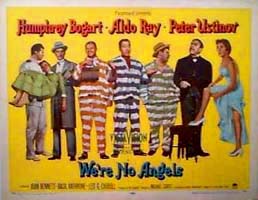
WE'RE NO ANGELS
US, 1954, 106 minutes, Colour.
Humphrey Bogart, Joan Bennett, Aldo Ray, Peter Ustinov, Leo G. Carroll, Basil Rathbone.
Directed by Michael Curtiz.
We're No Angels is a very attractive comedy. It was not praised at the time of its release in 1955. Somehow or other, the critics expected more. However, the film has worn quite well as an enjoyable comedy and makes frequent television appearances at Christmas time. It takes the Devil's Island setting and gently satirises it. It is very hard-hitting on the greed of aristocratic French society on Devil's Island and makes the contrast with the head of the family and the kindly, yet murderous, convicts. The film is a farce but it takes its farcical elements lightly. It is also gentle - even running the risk of being sentimental. However, much of the enjoyment comes from the casting of Humphrey Bogart, Peter Ustinov and Aldo Ray as the three lovable convicts. Basil Rathbone is expert at being the type of villain he portrays. Joan Bennett provides charm and glamour. All in all a most delightful comedy and an entertaining fable of good and evil. The 1989 remake was directed by Neil Jordan from a script by David Mamet, starring Robert de Niro and Sean Penn.
1. How attractive this film and enjoyable? How did it retain its interest?
2. How obvious were the French origins in style? Was it evident that the film was based on a play? How successfully was this adapted to American production?
3. The value of the colour, the Devil's Island sets, the period setting, the Christmas atmosphere, the music and the songs?
4. How humorous was the film? Even the gentle touch on Devil's Island, murderers and criminals? The humour and irony of the ending? The poking fun at 'the end justifies the means'? Murders as executions? The ironic humour with the gentle touch? How effective? Why?
5. The film seen as a fairy story? The fact that it was not to be taken realistically? The Christmas story and the Three Wise Men? Audience response to this,- style? (Did the film avoid the dangers of sentimentality?)
6. The three convicts, their escape, their initial cruelty and then their change? Their washing-up, brightening the house and the shop, listening and offering counsel, helping in small details, the delight of the Christmas Dinner? The irony of niceness and generosity in the convicts? Comment on the individual in character and style of each of the convicts? The style of Humphrey Bogart, of Peter Ustinov, of Aldo Ray? How did they all combine together?
7. The picture of the Ducotel family: the doddering father and his good nature, his wife and her tiredness of Devil's Island, the daughter as the young girl (her continual fainting)? Their difficulties, their discussion, their love for each other, their being victimised by their cousin? Sharing things with the convicts? Being helped by the convicts? Were the family drawn as characters? Or just indications of particular themes?
8. Cousin Andre and Paul: snobs and the satire on their snobbery and greed? Arrogance and their being killed by Adolph? Paul as a younger version of Cousin Andre?
9. How satisfying was the happy ending? The return to prison? The new boyfriend for the daughter?
10. The conventions of comedy and their use? The use of conventional ideas on good and evil and their being changed about? The themes of human nature?